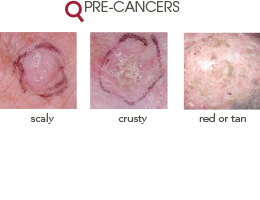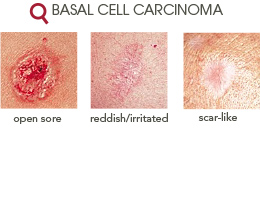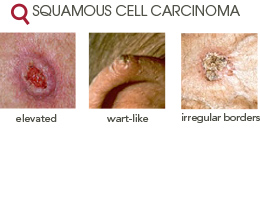Skin Cancer Types and Treatments
Skin cancer diagnosis starts with determining the type of skin cancer. The reason it is important to determine the type of cancer is because the type impacts the treatment options that may be available to you. Patients may be diagnosed with:
- Actinic keratosis, or pre-cancers
- Basal cell carcinoma
- Squamous cell carcinoma
- Malignant melanoma
Skin cancer diagnosis involves a visual examination of the skin by one of our experienced dermatologists. If we suspect skin cancer, we take a small skin sample (known as a biopsy) and analyze it to confirm whether cancerous cells are present.



 Basal cell carcinoma is the most common form of skin cancer, affecting nearly 3 million Americans each year. Basal cell carcinoma develops when the basal cells that line the deepest layer of the epidermis, which is the outermost layer of skin, grow uncontrollably.
Basal cell carcinoma is the most common form of skin cancer, affecting nearly 3 million Americans each year. Basal cell carcinoma develops when the basal cells that line the deepest layer of the epidermis, which is the outermost layer of skin, grow uncontrollably. Squamous cell carcinoma is a common form of skin cancer, affecting about 700,000 Americans each year. Squamous cell carcinoma develops when the squamous cells in the epidermis, which is the outer layer of skin, turn abnormal and grow uncontrollably.
Squamous cell carcinoma is a common form of skin cancer, affecting about 700,000 Americans each year. Squamous cell carcinoma develops when the squamous cells in the epidermis, which is the outer layer of skin, turn abnormal and grow uncontrollably. Melanoma is the most rare and serious form of skin cancer. It accounts for about 5 percent of all skin cancer cases, and the number of cases has been rising steadily for the last 30 years.
Melanoma is the most rare and serious form of skin cancer. It accounts for about 5 percent of all skin cancer cases, and the number of cases has been rising steadily for the last 30 years.